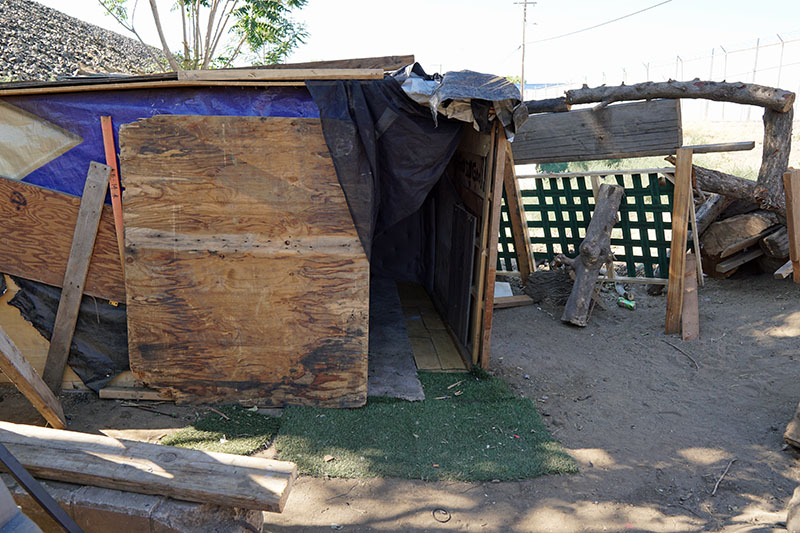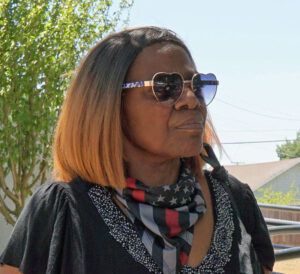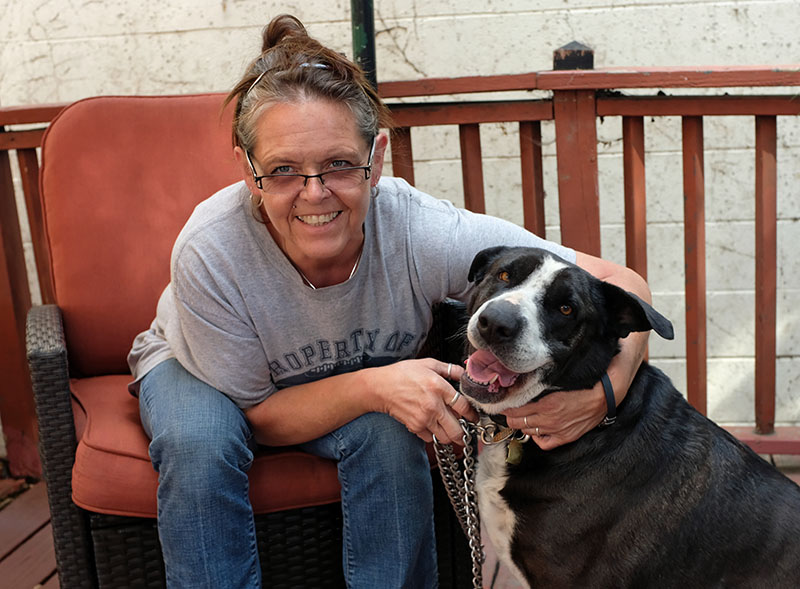For years, the dominant explanations for homelessness have been drugs and choice. Whenever the topic of homelessness arose, people were quick to say, “It’s the drugs.” And if they didn’t rant about drugs and needles, the alternative was to argue that homelessness was a “choice” people made to avoid the responsibilities of self-sufficiency.
Occasionally, someone would point out that doing away with mental institutions and social services might have had something to do with the rise in homeless numbers, especially since studies show consistently that between thirty and forty percent of homeless people are mentally ill.
More recently, rising rents have been recognized as driving factors in the increase of homelessness. Almost no one, however, has really put together the intricate mosaic of pieces of the American economy that have contributed not just to a rise in homelessness but to widespread poverty in general.
Consider, for example, that as productivity of goods and services rose over the last forty years, wages for middle-income workers declined relative to inflation. The decline wasn’t trivial:
According to the Economic Policy Institute, “Between 1979 and 2017, the compensation of median workers trailed economywide (net) productivity growth by roughly 43%, leading to rising inequality.”
In short, even as people worked harder and produced more, their wages declined.

As middle-income wages declined, housing costs rose. In fact, “Median home prices increased 121 percent nationwide since 1960, but median household income only increased 29 percent.”
But even as these inexorable economic forces wrought increasing hardship on America’s wage earners, rising numbers of people living in poverty and experiencing homelessness were attributed to drugs, a decline in family values, and bad “choices.”
Rising housing costs and rents have been especially hard on wage earners in west coast regions like the Bay Area and Los Angeles County, where income to housing-cost ratios are among the highest in the nation. One consequence has been an outflow of residents to distant cities and increased pressure on housing supplies.
Cities like Modesto and Manteca in the northern San Joaquin Valley have become “bedroom communities” for Bay Area commuters whose incomes dwarf those of typical Valley workers. The consequent upward pressure on housing costs has resulted in rising numbers of eviction notices for renters whose monthly incomes couldn’t sustain even a modest rent increase.
One such former renter is Theresa Carr. At 71, Carr has custody of two great-grandchildren, aged eight and nine. She and the children are currently living in a motor home, parked on a street in Modesto. On a fixed income from Social Security, Carr’s attempts to find an affordable rental keep foundering on forty- and fifty-dollar application fees.
“They take your application, charge you forty- or fifty-dollars, and then you never hear from them,” says Theresa Carr. “They say they’ll send you an email and they never do.”

Carr has been looking for a place to live since October of last year, when rent for the apartment she’d been in for 10 years went up by $150 a month. In an increasingly common scenario, the property owner died and his heirs decided to revise agreements with renters, included retroactive increases in security deposits.
“I paid the rent every month,” said Carr last week. “I never missed a payment. Then I found an eviction notice posted outside my rental for everyone to see.”
“Not everyone is out here because of drugs,” said Carr, gazing at homeless people in a park in west Modesto. “There are lots of different reasons people become homeless.”
Not far from that same park, Irene Hopper-Gomez has a month to move from her studio rental, which was sold to new owners. Before becoming disabled and receiving disability income, Hopper-Gomez worked for Stanislaus County.
“It’s outrageous,” says Hopper-Gomez. “For one room with kitchen and bathroom, it’s $800 to $1200 a month, if you can find one.”
In fact, average rent in Modesto rose 10% over the last year and is now $1407 a month. Average apartment size is 785 square feet.
Brigett Moore, another Modesto resident who was recently served with eviction notices, considers herself fortunate to have found a rental only a couple of weeks before facing homelessness. Moore is a former drug user who was homeless and went through rehabilitation programs in Stanislaus County, returned to the workplace, then underwent surgery for carpal tunnel syndrome last fall.
“Stanislaus County was always there for me,” she said last week of people in her rehabilitation programs. “They never let me down.”
Once back in the workplace, Moore raised her credit score almost two-hundred points. She is frugal and thrifty and managed to save enough money to pull her through the hard times brought on by missing work because of surgery. Nevertheless, despite her recovery and hard work, she just recently came precariously close to another bout of homelessness. Though having a pet made her quest for a rental more difficult, she refused to give up her beloved dog, Coco, even when faced with another bout of homelessness. She also has a cat.

When housing costs move from merely difficult to impossible for people who have worked, obeyed the rules, and pulled themselves up from poverty and despair, it’s not just wrong to blame homelessness on drugs and poor choices, it’s a gross insult. It’s also an affront to people like Brigett Moore, who worked the programs, got off drugs, and went to work, only to find that hard work, frugality and thrift could still leave her on the precarious edge of homelessness.
As long as homeless people continue to be lumped into abstract categories like “vagrant” or “transient,” and dismissed as addicts, the human costs of punitive market forces can be ignored. But even a cursory look at the devastating effects of housing to income ratios on good people who worked hard offers a sobering reality of the human consequences of market forces.
More and more often, the homeless among us are just good citizens suffering from bad times. We need to accept those facts and begin acting humanely to address them.

Congratulations Brigett!! I saw your journey start at Beard Brook, and you have continued to make a good life for yourself and your furbabies.
Ally Best
Thanks I give Him all the glory and those He has and still is putting in my path thanks to ALL the volunteers n so many who gave of their self time n families to make alot of us feel special n that people actually care I would not be where I am if it was not for Stanislaus County from those I lived with in the streets to some law officials too…special thanks to a dozen or so law enforcement that showed me your not all the same as I saw in Sac…
Eric — are there ways for individuals to make micro loans (like the Kiva organization, Kiva.org) or gifts which will help specific people who just need a bit of a lift? Is there a local organization/non-profit that handles issues like this? I donated most of the “stimulus” $$ that I received to 2nd Harvest Food bank. I know that donations aren’t fixing the root cause of home and food insecurity, but can help people make it through the short term. — Elaine
Elaine, there are many great organizations. My view is that donations buy more when they lead to political change. We need a return to the government of Dwight David Eisenhower, Harry Truman, John F Kennedy and Lyndon Johnson. However, many good local organizations use donations wisely, including Family Promise.
Hi Elaine. The Peace/Life Center has a Homeless fund made from small donations that does exactly what you stated. See a short write-up in this months Connections.
The gift that I do myself wanting to show others there is hope I have been where you are the struggle is real prayer is our key Jesus is our answer even if you fall keep hold of Him He will work all things out according to His perfect plan n time so I go out at night (was 3x a week till this move BUT it will change I claim it in Jesus) anyways Hungry@Nite2 I called it may be for food may be for hope or a small scripture or saying on the bag I pass out late at night even if asleep they wake hungry there is food next to them. Have not asked for donations I trust the Lord will make a way for what He has called me to do it age 12 He has He is even with things tight now I know he will too Inhave seen how faithful He has been in there years Neither I nor man could have brought me n Coco from recycling n finding a meal the same way to where I am today worn out He gives me the strength n courage to keep moving
As the Economic Policy Institute is closely aligned with labor unions and the “Democratic Socialist Movement”, it is not surprising that this writer offers it’s data as absolute fact; is it?
Actually, supply and demand set the value/price of everything, including rents. When regulations limit building and rental markets are affected by them, the price goes up, naturally.
While this writer might never be able to report it, the Real Wage growth of the ’50th Percentile’ [the lowest] was greater under the Trump Administration than at any since 1970. For instance; the median household income in 2019 grew a whopping 6.8%, the largest annual increase on record., according to the U.S. Census Bureau. Lower and middle-income folks were also finally sharing more in the country’s growing wealth. Notably, median household incomes increased more among Hispanics (7.1%), blacks (7.9%), Asians (10.6%) and foreign-born workers (8.5%) versus whites (5.7%) and native-born Americans (6.2%). One reason is more Americans with lower education levels were working.. [WSJ, 9/16/2020]
Socialist wish the forced ‘re-distribution of wealth’ while capitalist believe that Saving and prudent Investment are the key to success within our system; regulation can only serve to hinder markets and drag us all down, economically.
So tell me, Mr. Losh, what is the value of a human life? What is the value of a place to live for someone who does not have a place to live? There is a tremendous demand for housing now, especially from people who can’t afford it. Where is the supply to meet that demand? Your simplistic equations don’t include the human element, nor do they account for the reality our eyes and ears register every day. The Obama boom continued while Trump was in office, that’s true. However, Trump’s mismanagement of the pandemic and his tax cuts for the rich wiped out many of the gains.
I wonder how much corporate socialism Mr. Losh benefits from? I thought you were very clear Eric that price gouging was first and foremost responsible for the astronomical rise in rents. You know, like the companies that sell needed materials after a disaster with huge price increases. Our disaster is that there is not enough housing and the market determines who gets what. Its called GREED plain and simple. With greed as a part of the equation, then of course, humans as well as the environment just don’t matter.
Do you believe Mr. Losh that housing is a human right or simply something you have to earn? Not enough money, sorry, you’re homeless!
Median Household Income divides households into two (2) groups: those with incomes above the median and those with incomes below the median. You know.
The middle class (I literally loath the use and meaning of class or caste, etcetera, yet, for the sake of communicating a thought), used to be a larger group who HAD more income, but, SLIPPED DOWNWARD, as the gap between the HAVES and HAVE NOTS has intentionally widened, as you must have heard.
NO ONE is safe from falling through the many cracks in the System. Eric Caine serves us ALL well as he points out what may not be obvious to those yet in denial.
Affordable housing is scarce, in every neighborhood. The current economy is sick. Many homeowners appear to be out for whatever they can get before the System gets them, first, like a giant steam roller flattening ALL in IT’s way. We ALL know something IS terribly wrong. LOSS is coming swiftly to someone we ALL know.
I do not advocate isms: socialism, communism, and, capitalism is under deep scrutiny, and needs to be so.
WE ALL need Consciousness Raising encounters and Critical Thinking enhancings.
An intentional decision was carried out, a long, long time ago, to NOT teach Critical Thinking in the Public School System. We were kept dumb so that the majority merely knew enough to serve as cogs in the plans of the greedy. Alot has been done to American Citizens and ALL in IT’s reach.
Do not know about you, but, I sincerely suggest that WE ALL questions our OWN and everyone elses’ assumptions. There is not a second to spare.
We can ALL learn from what Eric and ALL other Valley Citizens post and reply. I learn something from each and everyone.
R.T. Losh: I reply to you because your use of Median Household Income moved me.
While Losh does have a point that permit costs and other regulations impede construction that would help alleviate the housing shortage (and resulting high prices), his conclusion that socialist “forced redistribution” is the problem is way off base and ignores reality.
If we lived in a socialist society, those without houses would be housed. Period. But we don’t live in a socialist society, so our homeless fellow citizens sleep outside. We do however live in a corporatist oligarchy, where the super rich use their wealth and power to control legislation in their favor—and often at the expense of everyone else.
This dynamic has only grown since the pandemic, but even in 2014 the facts supported the assertion that “that economic elites and organized groups representing business interests have substantial independent impacts on U.S. government policy, while average citizens and mass-based interest groups have little or no independent influence.” https://www.cambridge.org/core/journals/perspectives-on-politics/article/testing-theories-of-american-politics-elites-interest-groups-and-average-citizens/62327F513959D0A304D4893B382B992B
To repeat: “business interests have substantial independent impacts on…government policy,” while “average citizens…have little or [none].” Does that sound like socialism to you, Losh? If so, please enroll in a political science 101 course at your local community college.
The predominant form of socialism practiced in our country is socialism for the super rich. This is a fact. Very large corporations and other Wall Street interests like big banks have received socialist bail-outs no fewer than three times since 2001: in the aftermath of 9/11, in the aftermath of the housing crisis they created in 2008/2009, and right after the pandemic hit in 2020. These bailouts are worth trillions and are way more than the common citizens received. But according to Losh, it’s socialism for the little guy that’s causing all the problems. He has no problem with the Federal Reserve and Treasury giving away trillions of dollars in unearned wealth to corporate America and Wall Street, but heaven forbid a homeless person priced out the housing market receive any government help. Which side are you on, Losh?
Let’s look at the median household income statistics Losh cites. He calls a 6.8% increase a “whopping increase.” What, then, does he call the 9% increase in California housing prices between May 2017 and May 2019. It basically wipes out that “whopping 6.8%” increase he refers to so glowingly. These numbers are from the Business Insider, hardly a socialist publication (https://www.businessinsider.com/california-home-price-hits-record-high-2018-6?op=1).
And during the Donald Trump administration, house prices exploded in Stanislaus County from an average of $279,750 to $385,000. That’s a 37% increase in four years. Do you think the median household income in California rose 37%, too? And let’s look at rents. Between 2016 and 2020, average California rents increased 22%, from 1,182 for a 2-bedroom unit to $1,446 (https://www.rentdata.org/states/california/2020 ).
Kind of puts the “whopping” median household income increases into truer perspective. So many Californians are homeless today not because they’re lazy or don’t save enough but because of conditions beyond their control. We do not live in a socialist system; we live under a rapacious oligarchy that ignores repeatedly the needs of the common people. Both parties are to blame. Republicans (including Trump) and Democrats (including Biden).
Again Losh: which side are you on?